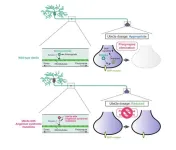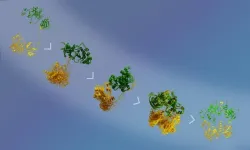(Press-News.org) The European starling boasts a remarkable repertoire. Versatile songbirds that learn warbles, whistles, calls, and songs throughout their lives, starlings rank among the most advanced avian vocal learners. Now a new study published in Science finds that starlings, along with other complex vocal learners, are also superior problem solvers.
“There is a long-standing hypothesis that only the most intelligent animals are capable of complex vocal learning,” says Jean-Nicolas Audet, a research associate in the laboratory of Erich Jarvis at The Rockefeller University. “If that is true, then complex vocal learners should also be better at cognitive tasks, but no one had ever demonstrated that before.”
Only a handful of animal groups are capable of complex vocal learning, roughly defined as the ability to learn and retain a large number of sounds. Humans, elephants, whales, seals, and bats represent most mammalian vocal learners; songbirds, parrots and hummingbirds cover the birds. The Jarvis lab has long focused on songbirds, and ranks their vocal learning complexity across three metrics: how many songs and calls are in the bird’s repertoire, whether the bird can continue to learn new songs and calls throughout its life, and whether it can mimic other species.
To determine whether vocal learning is linked to different cognitive abilities in songbirds, Audet and colleagues spent three years catching hundreds of wild birds from 21 species in mist nets at The Rockefeller University Field Research Center, a sprawling 1,200 protected acres of land compromising many different ecosystems in New York’s Hudson Valley.
“It’s a protected area, which means the animals have limited exposure to humans,” says Mélanie Couture, a research assistant who worked on the study. “This is ideal for studying the behaviors of wild birds—what they can do, and how they react to cognitive tasks.”
Upon ranking the vocal learning capabilities of their subjects, three frontrunners emerged: starlings, blue jays, and gray catbirds (relatives of mockingbirds). These were also the only three capable of mimicking other species (“the epitome of vocal learning,” Audet says).
The team then ran a battery of cognitive tests on 214 birds from 23 species (including two lab-raised bird species that were added to the wild-caught birds). They tested problem-solving abilities by challenging the birds to remove a lid, pierce foil, or pull a stick to retrieve a treat. Self-control was assessed by placing a transparent barrier between each bird and a snack, and recording how long it took the birds to stop butting up against the barrier and go around it. Other tests analyzed whether the birds could learn to associate a certain color with a food reward, and how quickly the birds adapted when the associated color changed.
Statistical analyses revealed a strong correlation between problem solving abilities and vocal learning abilities. Starlings, bluejays, and catbirds were not only the most advanced vocal learners, but also the most adept at solving puzzles, and the better a bird was at working its way around obstacles to nab a treat, the more complex its vocal learning ability. There was no association between the other cognitive tests and vocal learning complexity.
The researchers also found that advanced vocal learners and problem solvers had larger brains relative to the sizes of their bodies—a potential biological basis for the observations. “Our next step is to look at the brains of the most complex species and try to understand why they are better at problem solving and vocal learning,” Audet says. “We have a pretty good idea of where vocal learning happens in the brain, but it’s not yet clear where problem solving occurs.”
Overall, the findings suggest that vocal learning, problem solving, and brain size may have evolved in tandem, perhaps as a way of increasing biological fitness. Based on these findings, as well as earlier work on the ability of vocal learners to dance to a rhythmic beat, Jarvis is now calling this collection of traits the “vocal learning cognitive complex”.
“Our findings help support a previously unproven notion: that the evolution of a complex behavior like spoken language, which depends on vocal learning, is associated with co-evolution of other complex behaviors,” Jarvis says.
END
Vocal learning linked to problem solving skills and brain size
2023-09-14
ELSE PRESS RELEASES FROM THIS DATE:
Study finds spiritual coping behaviors may be key to enhanced trauma recovery of Black men who survive firearm injury
2023-09-14
PHILADELPHIA (September 14, 2023) – High rates of firearm injury among urban Black men in the U.S. can lead to long physical and psychological recovery times, worsened by limited access to mental health services. In the face of firearm injury, urban Black men may feel they have lost control over their lives, leading to fear, paranoia, lack of forgiveness, and different dimensions of mental health challenges, which can be difficult to overcome.
In a pilot study from the University of Pennsylvania School of Nursing ...
In the “I” of the beholder: People believe self-relevant artwork is more beautiful
2023-09-14
People have fairly consistent preferences when it comes to judging the beauty of things in the real world—it’s well known, for example, that humans prefer symmetrical faces. But our feelings about art may be more personal, causing us to prefer art that speaks to our sense of self, research in Psychological Science suggests.
“When there is personal meaning in an image, that can dominate your aesthetic judgments way more than any image feature,” said Edward A. Vessel (The City College of New York) in an interview. Though self-relevant ...
Aspergillus fumigatus is a saprotrophic fungus that can cause serious life-threatening invasive infections in immunocompromised individuals
2023-09-14
Aspergillus fumigatus is a saprotrophic fungus that can cause serious life-threatening invasive infections in immunocompromised individuals; by constructing a recombination map, this study shows that A. fumigatus produces the highest number of crossovers per chromosome ever described (~30 per chromosome pair).
#####
In your coverage, please use this URL to provide access to the freely available paper in PLOS Biology: http://journals.plos.org/plosbiology/article?id=10.1371/journal.pbio.3002278
Article Title: The human fungal pathogen Aspergillus fumigatus can produce ...
During failure of core protein quality control in the nematode C. elegans, a specialized anti-aggregation mechanism relying on pathogen response factors and lysosomal mediated degradation is triggered
2023-09-14
During failure of core protein quality control in the nematode C. elegans, a specialized anti-aggregation mechanism relying on pathogen response factors and lysosomal mediated degradation is triggered, promoting tissue-specific resilience to age-dependent protein aggregation and its proteotoxicity.
#####
In your coverage, please use this URL to provide access to the freely available paper in PLOS Biology: http://journals.plos.org/plosbiology/article?id=10.1371/journal.pbio.3002284
Article Title: A safety mechanism enables tissue-specific resistance to protein aggregation during aging in C. ...
How a molecule deletes neural chat might help treat Angelman syndrome
2023-09-14
Researchers from the University of Tokyo reveal how the presynaptic Ube3a E3 ligase, a causal factor in Angelman syndrome, eliminates neural chat. The study helps find a better drug target for the Angelman syndrome treatment.
Neurons chat through electrical signals, transmitting information via connection sites between neurons—the synapses. After birth, the number of synapses increases. During childhood, the brain starts to mature and removes many unnecessary synapses. But sometimes, the development of the nervous system goes awry, leading to developmental disorders.
Kotaro ...
In songbirds, complex vocal learning predicts problem-solving abilities and brain size
2023-09-14
Vocal learning complexity, or the ability to imitate sounds, is associated with better problem-solving abilities and larger brains in songbird species, according to a new study. Whether vocal learning complexity was linked with such cognitive phenotypes was previously unknown. The approach used in the study, to study a lineage of birds, serves as a model for testing similar patterns in other vocal learning species. Complex vocal learning – the ability to imitate heard sounds – is a crucial component of human spoken language and has been assumed to be associated with more advanced cognitive abilities. Outside of humans, it has ...
Governance reforms could strengthen the Sustainable Development Goal implementation
2023-09-14
In a Policy Forum, Frank Biermann and colleagues outline demanding – yet realistic – policy reforms to strengthen the governance and implementation of the United Nations’ (UN) ambitious Sustainable Development Goals (SDGs). In 2015, the UN General Assembly agreed on 17 SDGs with 169 targets intended to be achieved by 2030. However, recent research has shown that the political impact of these goals has been limited and has not yet succeeded in reorienting political systems, institutions, or societies ...
Switching off the cytokine storm
2023-09-14
Constant exposure of cells to stressing agents, such as pathogens, may disturb an organism’s normal functioning. To fight stress, cells have developed several coping mechanisms, including the inflammatory response.
While inflammation is necessary, too much of it can impair cell and organ function. This is the case with cytokine storms – inflammatory cascades during an infection that can spiral out of control and lead to severe disease and even death, as recently highlighted during the COVID-19 pandemic.
In a new paper published in Science, EMBL Grenoble and University ...
Specialised gut immune cells pinpointed that can limit progression of inflammatory bowel disease
2023-09-14
Researchers at the Francis Crick Institute, King’s College London and Guy’s and St Thomas’ NHS Foundation Trust have characterised a specialised type of immune cell, which plays a key role in protecting and repairing the cells in the healthy human gut.
These protective immune cells are depleted in inflammatory bowel disease (IBD), leaving patients vulnerable to disease progression and severe complications. The findings could lead to better clinical management and treatment options for people living ...
Researchers call for major reforms of the UN Sustainable Development Goals: SDG Summit a decisive moment
2023-09-14
On 18-19 September, the United Nations will convene a major summit to review the state of the Sustainable Development Goals (SDGs)—the 17 global goals that governments agreed upon in 2015 to guide action towards a prosperous and just future. With research showing that the SDGs have since then had little political impact, the UN Summit must pave the way for four major changes in how the SDGs are implemented and governed globally, argues an international group of experts in Science.
The article, based on research led by Utrecht University in the Netherlands, brought together a group of scholars with broad expertise in global sustainability governance. “Our ...








